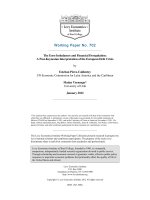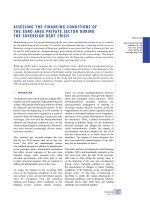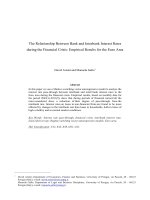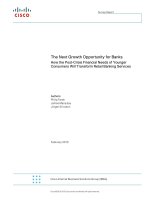Marsh europes deadlock; how the euro crisis could be solved and why it wont happen (2013)
Bạn đang xem bản rút gọn của tài liệu. Xem và tải ngay bản đầy đủ của tài liệu tại đây (1.01 MB, 145 trang )
“Marsh exposes the basic problem of the euro: no one’s in charge.
Monetary union was a colossally risky experiment launched without
adequate crisis management precautions and without centralised
political oversight. Unlike the other countries, Britain properly
analysed the risks and decided, rightly, to stay out. It’s a pity that
other Europeans didn’t show similar caution.”
—Lord ( John) McFall, member of House of Lords Economic
Affairs committee, former chairman, House of Commons
Treasury Committee
“An admirably lucid analysis. Marsh weaves together the politics as
well as the economics of the euro. In Europe (very properly) politics
is about democracy. If the euro area is to become more integrated,
as it must in order to survive, then the democratic deficit, which
is already bad enough, would become intolerable. This is a hugely
important issue.”
—Lord (Nigel) Lawson, former Chancellor of the Exchequer
“David Marsh has once again placed his finger on the gaping wounds
that continue to afflict the European Monetary Union. While not
everyone will agree with his conclusions – and a great many more
will hope that he is wrong – he has built a cogent case for being very
worried about the future of the single currency.”
—Prof. Michael Burda, School of Business and Economics,
Humboldt University of Berlin
“Europe is brilliantly right because it has achieved zero prospect
of war, an achievement no other region can match. Yet it’s also
brilliantly wrong because it has tried to achieve an impossible dream:
monetary union without fiscal union. Marsh explains well the
European mess and even suggests a solution. His book is a must read
for European policy-makers. Even Asians may learn a lesson or two.”
—Prof. Kishore Mahbubani, Dean, Lee Kuan Yew School of Public
Policy, National University of Singapore
“A brilliant and incisive analysis of the intractable practical and
political problems facing the euro and why the hopes of its founders
have been disappointed.”
—Lord (Christopher) Tugendhat, chairman, House of Lords EU
External Affairs committee, former European Commissioner
“The fate of the euro area is the most momentous public issue of our
times and there is no better guide than this gripping, well-informed
study by the leading expert on its genesis and development.”
—Prof. William Paterson, Honorary Professor of German and
European Politics, Aston Centre for Europe, University of Aston
“This book deserves wide discussion among harried and frustrated
policy-makers. I am happy that Marsh has taken up the challenge of
discussing a plan to make the euro survive for the longer term. Even
though he exaggerates some of the difficulties, this book will have
an important impact.”
—Prof. Niels Thygesen, Emeritus Professor of Economics,
University of Copenhagen, member of the Delors Committee on
Monetary Union
“This precise, elegant, and humorous depiction of Germany’s
unique role in the euro drama brings the reader to the central
argument: without political union, monetary union is left weak
or even unviable. A single central bank needs a single political
counterparty. Marsh argues that the euro crisis will linger to the
point of becoming chronic but rejects the notion of a rapid, dramatic
disintegration. It is difficult to imagine a pathway back to national
currencies that would not entail even greater catastrophe.”
—Prof. Maria Antonieta Del Tedesco Lins, Professor of
International Relations, University of São Paulo
“A lucid and well-informed, if somewhat German-centric, account
of the development of the euro crisis, in which Marsh explains,
with admirable clarity, why the crisis has been so difficult to resolve.
Although he charts a way out, he makes clear his scepticism that
Europe’s leaders can deliver on their many promises to reform.
Even if he is only half right, pro-Europeans should heed his analysis
and warnings, and ask themselves whether the governance changes
adopted to date go far enough.”
—Prof. Iain Begg, European Institute, London School of Economics
and Political Science
“This book is right to question how the EU can sort out the
economic and social mess created by the euro. It is a case of having
a bank account with the neighbours before they have worked out
who pays all the bills. David Marsh tries to pilot a way through
these troubles.”
—John Redwood MP, Chairman, Conservative Party Economic
Policy Committee
“An excellent analysis of the crisis in the euro area. The
comprehensive diagnosis of the causes of the crisis is accompanied
by a sobering prognosis regarding the prospects for its resolution
anytime soon.”
—Prof. Simon Bulmer, Professor of European Politics, University
of Sheffield
EUROPE’S DEADLOCK
David Marsh is Europe’s foremost chronicler of post-war monetary affairs. Chairman and co-founder of the Official Monetary and
Financial Institutions Forum (OMFIF), he wrote for the Financial
Times between 1978 and 1995, including in France and Germany, becoming European editor, and subsequently worked in City financial
institutions. He is the author of four acclaimed books on European
politics and money, including The Euro: The Battle for the New Global
Currency (2009 and 2011).
How the Euro Crisis
Could Be Solved – and
Why It Won’t Happen
YALE UNIVERSIT Y PRESS
NEW HAVEN AND LONDON
Copyright © 2013 David Marsh
The right of David Marsh to be identified as author of this work has been asserted
by him in accordance with the Copyright, Designs and Patents Act 1988.
All rights reserved. This book may not be reproduced in whole or in part, in any
form (beyond that copying permitted by Sections 107 and 108 of the U.S. Copyright Law and except by reviewers for the public press) without written permission
from the publishers.
For information about this and other Yale University Press publications, please
contact:
U.S. Office: yalebooks.com
Europe Office: www.yalebooks.co.uk
Set in Arno Pro by Yale University Press
Printed in Great Britain by Hobbs the Printers Ltd, Totton, Hampshire
Library of Congress Control Number: 2013942358
ISBN 978-0-300-20120-8
A catalogue record for this book is available from the British Library.
10 9 8 7 6 5 4 3 2 1
2017 2016 2015 2014 2013
Contents
Preface
1
2
3
4
5
6
7
8
9
10
11
12
13
14
15
16
17
18
19
20
xi
Introduction
Unhappy family
Dashed illusions
The German question revisited
Winners and losers
A dangerous vacuum
Irreparable errors
The technocrats stumble
A bank unlike the others
The Cyprus cauldron
Sovereignty – the tipping point
Fear holds the key
Germany’s limits
The French connection
The Bundesbank strikes back
In Italy, more showdowns
The chimera of banking union
The IMF’s European conundrum
Anglo-Saxon ambivalence
Asia’s star rises
War and peace
1
4
13
20
26
31
36
42
48
53
58
64
69
74
79
85
90
96
102
108
113
Notes
Index
121
123
Preface
The gestation phase for this book has been miraculously
and mercifully short. In March 2013 Christian Strasser of
Germany’s Europa Verlag persuaded me to write a short book
in German to elaborate on my thesis that the euro crisis could
not be resolved. I delivered a text in about six weeks, and then
naturally had to write one in English. (In some ways this was
more precise, more difficult and more detailed, for example
with my plan for a properly federal Europe, which I don’t think
anyone wants to put into effect.) I would like to thank many
colleagues and friends who (often unconsciously) have assisted
my efforts to understand what is going on; I would like to single
out Niels Thygesen, Meghnad Desai, Oscar Lewisohn and
Michael Stürmer for help with the text. Lauren Roberts, Edward
Longhurst-Pierce and everyone else at OMFIF have as always
been of great assistance in lots of ways, and my family has again
shown forbearance. Thanks to Robert Baldock and Phoebe
Clapham at Yale University Press for pushing this through.
David Marsh
Wimbledon, June 2013
Introduction
History shows us how periods of unstable equilibrium can
last a surprisingly long time. During the First World War, the
western front was frozen into the terrain for three-and-a-half
years. The Cold War between the Soviet Union and the US
lasted forty years. For four centuries, Greece was part of the
Ottoman Empire. Consequently, we should cherish no false
illusions about a quick end to the euro crisis.
Europe embarked on the experiment of monetary union
in a bid for unity. An associated aim was to render Germany
harmless and relatively powerless after German unification and
to prevent a return to the old demons that laid waste to Europe
in the first half of the twentieth century. After five years of
supremely lacklustre crisis management since the world was hit
by widespread financial upheavals in 2007–08, the European
currency saga now pits the creditor countries which have built
up large external payments surpluses – led by Germany – against
the debtors from the mainly southern peripheral states.
Far from being permanently hamstrung by the loss of the DMark and the subsuming of the country’s famously independent
central bank, the Bundesbank, into the multinational European
1
e u r o p e ’s d e a d l o c k
Central Bank, Germany now wields greater clout over European politics and economics than anyone else. The problem is
that this apparently strong position makes the Germans highly
uncomfortable. Beset still by remorse or misgivings about the
last time it flexed its muscles in Europe, Germany has neither
desire nor capacity to be Europe’s leader. The pivotal country
on the continent has a sense of responsibility, but not of duty.
That is one of the main reasons why the euro crisis is unlikely
to be resolved. There is a hole in the heart of the currency. No
one is in charge.
This book describes how a venture that was intended to
improve Europe’s internal cohesion and effectiveness and its
global leadership credentials for a new millennium has run off
the rails. The reasons range from design flaws in the euro system
set up in 1999 – flaws that are slowly being corrected – to more
fundamental, hardly resoluble problems of incompatibility of
different countries’ political, economic and industrial cultures.
Further impediments have stemmed from muddled thinking,
lack of imagination and straightforward incompetence on the
part of the politicians and technocrats charged with policing the
single currency. All this has brought severe setbacks in the task
of permanently fusing national currencies, and has created the
fear – articulated even by Europe’s most senior leaders – that
the single currency might break up.
There are many potentially sensible ways of curing the euro’s
ills. These range from creating a proper political union for all
or some of the present members of the euro bloc, to a peace
deal between creditors and debtors, under which the stronger
countries pay for the weaker ones. All these ideas have been
2
introduction
proposed many times in the past, and they are outlined in this
book, particularly in the ten-point plan enumerated in Chapter
20. None seems likely to be enacted with sufficient vigour,
perseverance and political sophistication to promote lasting
recovery from the imbroglio. Europe, it is often said, has many
times drawn back from the brink and emerged victorious from
its travails. Yet this time may indeed be different. Not salvation,
but a long period of further confusion lies before us – not unlike
the inexplicable, unending conflict among Oceania, Eurasia and
Eastasia in George Orwell’s merciless Nineteen Eighty-Four.1 The
debtor versus creditor struggle is one of low-level belligerence
between bitter and intransigent adversaries, united only by the
certainty that no one will win or even survive unscathed. This
is an undeclared war without generals or commanding officers,
its course obscured by a welter of obfuscation, propaganda,
misinformation, half-truths and lies.
The euro area and its multiple institutions have invested
huge financial and political capital to manage the crisis, but
not to resolve it. Behind the euro’s manifold contradictions
lie disparate and divisive forces that make clear-cut outcomes
unlikely. We should prepare for neither resounding success nor
catastrophic failure, but instead for a further drawn-out phase of
standoff, slowdown and stalemate.
3
1 Unhappy family
Nearly fifteen years after the birth of the single currency
as a landmark project for political and economic integration,
Europe has healed some of the worst imbalances built up
during its rollercoaster ride into instability. But the correction
from earlier economic overheating has been achieved through
widespread austerity that has brought with it recession,
hardship and disruption, which in turn place a question mark
over European nations’ ability to stick together for the rest of
the journey. The trans-Atlantic financial crisis of 2007–08 and
the worldwide downturn in 2009 exposed fault lines in the euro
bloc that had earlier been largely hidden. In mid-2013, output
among the seventeen members of monetary union was around
2 per cent lower than before the 2009 slump. Yet this masked
widespread divergence between the stronger countries like
Germany, where the economy has grown by an overall 3 per
cent over this period, and the hardest-hit (and previously most
imbalanced) states such as Greece, where the economy is down
nearly 25 per cent, and Ireland, Italy, Spain and Portugal, where
declines vary between 4 and 6 per cent.
4
u n h a p p y fa m i ly
The wastefulness and dislocation of Europe’s efforts to curb
bloated costs and credit-fuelled speculative booms generated
by the single currency have been enormous. Millions of people
have had their hopes shattered. Unemployment in 2013 is 27
per cent of the labour force in Spain and Greece, 17 per cent in
Portugal, 15 per cent in Ireland, 11 per cent in France and Italy
– but only 6 per cent in Germany and the Netherlands. Public
sector debt across the euro area is around 95 per cent of gross
domestic product (economic output), compared with 70 per
cent in the early years of the single currency. Although there has
been much debate about relaxing austerity across the continent
to get growth going again, there is still no clear-cut map for the
arduous road ahead.
One of the worst outcomes of Europe’s malaise is that
populations and governments no longer feel in control of their
own destiny: in a debilitating transfer of responsibility, shadowy
outsiders in Berlin, Frankfurt or Brussels are apportioned
blame for national economic ills largely caused by home-made
mismanagement. Europe’s troubles therefore stem not simply
from the dire and divisive state of the economy, but also from
vexation and anger about the lack of legitimacy and democratic
control in new and ever more complex structures being erected
to try to correct these problems.
In theory, a blueprint for breaking out of the single currency
impasse is not too difficult to devise. Over many years, the
components of the master plan have been the subject of
endless academic dissertations, institutional reports, political
declarations and government treaties. The list of required
elements for success includes a certain amount of harmonisation
5
e u r o p e ’s d e a d l o c k
of economic aspiration, practice and performance; a degree of
political and cultural homogeneity; a readiness to share common
tasks and give up national decision-making in key fields; and an
ability and willingness to steer the overall construct, so that the
ensuing combination of costs, risks and benefits is reasonably
evenly shared.
Getting this balance right has so far been beyond the
capacity of the group of countries, led by France and Germany,
that have fused their common destinies within the euro.
This is a melancholy band; there are many explanations for
their diverse discontentment, exemplifying Tolstoy’s dictum
expressed in Anna Karenina: ‘Happy families are all alike; every
unhappy family is unhappy in its own way.’ The optimists say
the depth of discontent opens up a way forward. Citing past
episodes when Europe has emerged triumphant from crisis,
they argue that vexation is so great that Europe will somehow
miraculously forge solutions previously held to be impossible,
such as a pact for ironing out debts and credits across the euro
bloc or persuading the fearsomely competitive Germans to
make life easier for everyone else by increasing production
costs and lowering industrial effectiveness. However, all
kinds of positive-sounding artefacts to reinforce the euro
were proposed in previous periods of relative calm; they
were not enacted because no one really wanted them. Crises
tend to breed egotism among governments and peoples, not
solidarity. Widespread perceptions (such as in today’s Europe)
that hardship is being spread unfairly make countries more
antagonistic, not more level-headed. In most democracies,
willingness to put up with difficult and unpopular economic
6
u n h a p p y fa m i ly
reforms is low enough at the best of times, and can result in
the electorate’s rejection of the government that proposed or
implemented them. When, despite the outward appearance of
solidarity in a monetary union, there is no overall agreement on
burden-sharing at a higher European level, and when planned
European structures seem to lack sufficient democratic
control, then the readiness to carry out appropriate policies
will decrease still further. The European family will probably
remain unhappy.
A vital part in the many-sided politics of the euro is played
by the pivotal politician in Europe: the curiously inscrutable
figure of German Chancellor Angela Merkel, in office since
2005. At the centre of an array of conflicting strains and
tensions, she is pulled in different directions by opposing
influences. She conveys the impression of rock-like stability, but
in fact only a slight change in the balance of forces could cause
her to be blown away in the wind. There is a strong streak of
opportunism running through Merkel’s record as a frequently
ruthless political survivor. Outlasting her enemies was a skill
she first honed in the clandestine and cutthroat world of
communist East Germany. The German leader wields carrot
and stick like a conductor’s baton: a trace of European solidarity
here, a whiff of sound money there; a stern hand on the tiller
combined with a shove in the direction of the life raft for those
who fall overboard; a modicum of support (if deserved) for
France and Italy, a stab of school-matronly admonition for the
Greeks and Spaniards; espousal of self-help for errant countries
and rejection of bailouts; respect for the anti-inflation credo
of the politically independent central banks that are supposed
7
e u r o p e ’s d e a d l o c k
to be running the show, combined with wearisome regret that
sometimes they do not see the larger picture.
Such is the juxtaposition of contrasting forces that Merkel’s
Law of Permanent Disappointment is persistently on display.
According to the familiar pattern of euro politics, Germany’s
critics habitually call for concessions, which the Germans reject
as contravening the euro bloc’s tough conditions and invoking
the Weimar ghosts of hyperinflation and totalitarianism (a
plaintive yet exaggerated contention). Each time, as the pressure
builds, the Germans give in; each time, in an increasingly
irksome display of brinkmanship, this capitulation comes at a
later stage. Yet it is always only a partial surrender that leaves
no one satisfied and nothing resolved. The German cave-in is
never complete enough to resolve the euro’s problems or to
win more than grudging acknowledgement from supplicant
states pleading poverty. But it nearly always goes too far for
Merkel’s many critics in Germany, who say she has strayed too
far in toning down Germany’s rules on monetary stability or in
propping up profligate, ungrateful southerners with German
taxpayers’ money.
One point is clear, although it hardly makes resolution easier:
the pain felt by the peripheral euro states is overwhelmingly
their own fault. In Greece, Ireland, Portugal, Spain and Italy,
harsh corrective action has been necessary to overcome
serious policy mistakes in the euro’s early years. Countries
used the easier conditions of the single currency to do what
people, banks and institutions always do when interest rates
are precipitously lowered and then kept low – to live beyond
their means. Many euro members built up unsustainable debt
8
u n h a p p y fa m i ly
in the public or private sectors (or both) that was used to
finance speculative economic booms, rather than to generate
productive capital investment and lay down foundations for
the future.
A subsequent switch towards righting economic imbalances
has been necessary and inevitable. But there are three principal
difficulties with the outcome. First, sharp falls in domestic
demand and rising unemployment in crisis countries have
deepened economic downturns and resulted in ever-worsening
deflation that, by lowering tax revenues and weakening public
finances, have further reduced the ability of states to pay back
their debt – a self-perpetuating vicious circle.
Second, in normal cases around the world, where imprudent
states incur excess debt that leads to economic overheating,
policy rethinking normally leads to a devaluation of the national
currency, as part of a bid to achieve greater competitiveness.
This is then a component of an overall package of measures
to rebuild growth, for example, under the tutelage of the
International Monetary Fund (IMF). Under the conditions of
monetary union, the path of devaluation is blocked, unless the
euro as a whole becomes chronically weak on currency markets
(which would probably then further damage confidence) or
unless the country concerned takes the ultimate step (for many,
still wholly unthinkable) of leaving the monetary union. This
is one major reason why the sense of crisis in Europe has been
deeper than during comparable episodes in the past, and why
it is lingering longer. The various euro rescue packages offer
hard-hit states and their populations only very long and stony
pathways to recovery.
9
e u r o p e ’s d e a d l o c k
Third, in the case of those euro members where earlier rapid
expansion ran aground, there are grave question marks about
the governance arrangements that led later to a breakdown in
well-being and stability. The economic imbalances in the early
years occurred as an intrinsic part of a monetary regime that
allowed member states access to easier financing with few
questions asked about the outcomes. No one paid sufficient
attention to the problems building up below the surface. What
appeared to be a supremely benign experience went hideously
wrong. Furthermore, nearly everyone bore some responsibility,
and this is making attempts to clear up the tangle all the more
onerous.
Germany, overall, appeared to benefit. The euro countries
that embarked on debt-fuelled expansion absorbed great
volumes of German exports. Additionally, throughout the
period Germany’s currency was kept lower than it would
otherwise have been, providing a competitive exchange rate
that allowed German companies to prosper thanks to the muchincreased exports to the rest of the world. Price competitiveness,
together with big increases in Germany’s economic flexibility
following structural reforms by government and industry,
gave fresh impetus to Germany’s decades-old capacity to
manufacture products that the world wants to buy. As the euro
area’s largest economy and most important creditor, Germany
stands more or less alone in Europe in having circumvented
with apparent ease the world financial crisis of 2007–08 and the
subsequent downturn.
The Germans therefore face trenchant complaints from
debtor countries for allegedly inflicting vindictive deflation on
10
u n h a p p y fa m i ly
indebted peripheral states, whose earlier behaviour helped (and
continue to help) support German jobs and prosperity. In the
eyes of disaffected euro members, Germany not only refuses
to take overall responsibility for the skewed state of monetary
union, but also adopts an unfair moralising tone in criticising
ill-doings of partner countries whose actions it earlier tacitly
condoned. One of the euro’s objectives was to promote European peace and fraternity. Yet, under the conditions that have
emerged, in several southern euro members monetary union
has produced defamatory anti-German campaigns of a ferocity
not seen since the Second World War.
Angela Merkel has the longest experience and the most solid
credibility of current European leaders. Yet she (or her successor) cannot satisfy the oft-expressed desire for some form of
overt German leadership to guide the euro area to salvation.
This is not just because of the memories of the German bid
for domination seven decades ago, but also because of the irreconcilable mix of expectations. The calls of different factions
at home and abroad for firm German action – for cancelling
part of debtor countries’ borrowings, or for agreeing collective
European-wide state bonds (so-called eurobonds) so that others can benefit from Germany’s credit rating – cancel each other
out. For every European who would profit, there is a German
who would lose. Gridlock rules. Incessant calls for action from
partner countries inevitably run aground on insistent German
refusal to give way.
The euro is an overtly political project. This makes still
more alarming the shortcomings of the German and European
political class in failing to spot the earlier build-up of pressures,
11
e u r o p e ’s d e a d l o c k
and then permanently lagging in the response to the crisis
when it broke. The European leaders who, for varying reasons,
lent political impetus to monetary union recognised that the
monetary union of 1999 was incomplete. One of the biggest
impediments is that the European Central Bank, which provides
the euro’s main operating machinery, lacks a single European
political counterparty. Past evidence suggests that something of
this nature is needed for a single currency to function smoothly.
Monetary unions tend eventually to collapse unless they are
embedded in a coherent political framework that allows for
effective collective action and burden-sharing, for instance
through joint fiscal policy. Many people in many countries
affirmed this before and after the euro was born, but very little
was done either to prepare for possible problems or to tackle
them when they became evident. The euro is haunted by the
ghosts of past warnings that were not taken seriously until it was
too late.
12









